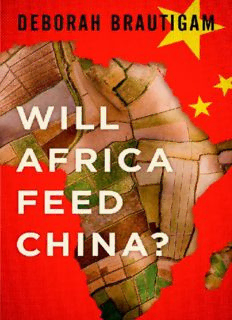
Will Africa Feed China? PDF
Preview Will Africa Feed China?
Will Africa Feed China? Will Africa Feed China? Deborah Brautigam 1 1 Oxford University Press is a department of the University of Oxford. It furthers the University’s objective of excellence in research, scholarship, and education by publishing worldwide. Oxford New York Auckland Cape Town Dar es Salaam Hong Kong Karachi Kuala Lumpur Madrid Melbourne Mexico City Nairobi New Delhi Shanghai Taipei Toronto With offices in Argentina Austria Brazil Chile Czech Republic France Greece Guatemala Hungary Italy Japan Poland Portugal Singapore South Korea Switzerland Thailand Turkey Ukraine Vietnam Oxford is a registered trademark of Oxford University Press in the UK and certain other countries. Published in the United States of America by Oxford University Press 198 Madison Avenue, New York, NY 10016 © Oxford University Press 2015 All rights reserved. No part of this publication may be reproduced, stored in a retrieval system, or transmitted, in any form or by any means, without the prior permission in writing of Oxford University Press, or as expressly permitted by law, by license, or under terms agreed with the appropriate reproduction rights organization. Inquiries concerning reproduction outside the scope of the above should be sent to the Rights Department, Oxford University Press, at the address above. You must not circulate this work in any other form and you must impose this same condition on any acquirer. Cataloging-in-Publication Data is on file with the Library of Congress. ISBN: 978–0–19–939685–6 9 8 7 6 5 4 3 2 1 Printed in the United States of America on acid-free paper For Amalie, Carrie, Jenna, Jeremy, Jesse, Lisa, Matthew, Max, Miles, and Oscar CONTENTS Acknowledgments ix List of Acronyms xiii Maps xvi Introduction 1 1. China and Mozambique: Fiction and Fact 11 2. “Begging with a Golden Bowl”: Food Security and Commercial Farms 20 3. Seeds of Change: Foreign Agribusiness Comes to China (and Chinese Agribusiness Goes to Africa) 37 4. Going Global in Agriculture: Incentives, Institutions, and Policies 56 5. Feeding Frenzy: “The Dangerous Allure of Google” 76 6. Taking Root in Africa: China State Farm Agribusiness Corporation 95 7. Sweet and Sour: Chinese Sugar Investments in Africa 112 8. Unfinished Business: Risks and Realities of China’s African Harvest 130 Conclusion: Lessons, Rumors, and Challenges 151 Appendix 1: Chinese Agricultural Investments in Africa, 1987–2014 165 Appendix 2: African Agricultural Exports to China, 2004–2013 169 Appendix 3: Chinese Agro-technology Demonstration Centers in Africa, 2006–2014 173 Notes 175 Index 205 ACKNOWLEDGMENTS An official in China’s Ministry of Agriculture once said to me: “It is dif- ficult to study this topic, even for us.” I couldn’t agree more. Hunger and food security, land grabbing, the fate of small farmers in faraway African villages, Chinese migration: all important topics, all with inadequate data, all covered by the international media with TV, radio, and newspaper sto- ries of sharply varying accuracy. Over the past decade, fact and fiction have merged into a conventional wisdom on China’s agricultural engagement in Africa that does not match the realities on the ground. Peeling away the lay- ers of myths required extensive fieldwork, grounded in an appreciation of the long, complex history and evolution of Africa’s experience with China. The result is, I hope, a more balanced and realistic account that can provide a baseline for current and future analyses of China’s rise and the impact this is likely to have in Africa. This book had its origin in research I did during a year as a visiting senior research fellow in the Development Strategy and Governance Division at the International Food Policy Research Institute (IFPRI), in Washington, DC. I thank Margaret McMillan, Paul Dorosh, Xinshen Diao, Xiaobo Zhang, Kevin Chen, and Shenggen Fan for their help and sup- port. I acknowledge with appreciation Johns Hopkins University School of Advanced International Studies, the Bill and Melinda Gates Foundation, Carnegie Corporation of New York, and the Smith Richardson Foundation, who all funded parts of this research. For their encouragement in urging me to dig further into the issue of Chinese “land grabs,” I thank Tony Allan, Martin Keulertz, Suvi Sojamo, Jeroen Warner, Philipp Baumgartner, and Carlos Oya. Participants at a May 2014 conference we organized at Johns Hopkins University on Chinese agricultural investment in Africa provided a terrific way to share early findings from our fieldwork and compare notes. I am grateful to the participants: Lila Buckley, Solange Guo Chatelard, Chen Xiaochen, Jessica Chu, Sérgio Chichava, Josh Maiyo, Margaret Myers, Nama Ouattara, Louis Putzel, Henry Tugendhat, Eckart Woertz, Xu Xuili, Yang Jiao and Zhou Jinyan. For their perceptive comments at our conference, I thank Peter
Description: